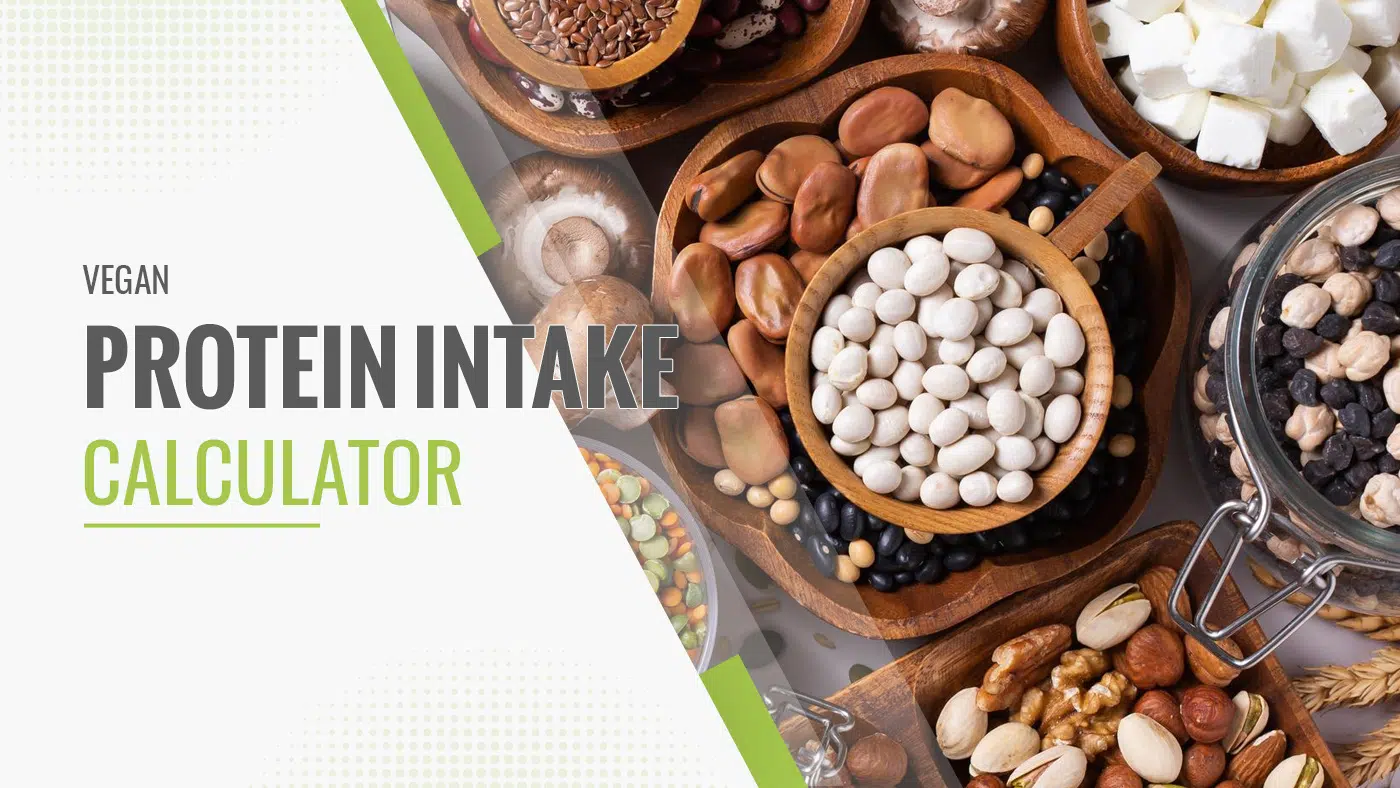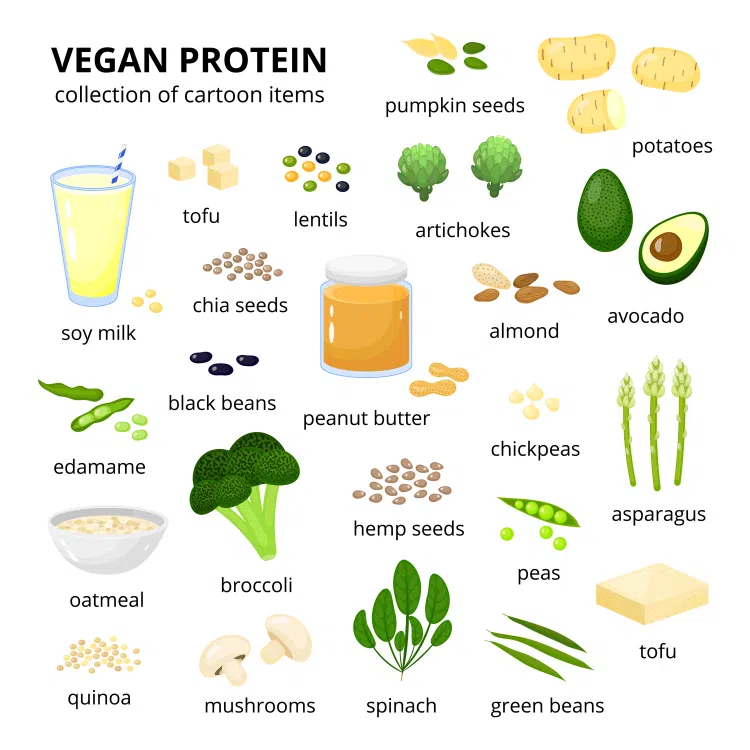Wondering how much protein you need on a vegan diet to stay healthy, build muscle, or lose weight? Our Vegan Protein Intake Calculator gives you personalized recommendations based on your age, weight, height, fitness goals, and activity level. Whether you’re an athlete or just starting out, this tool helps you plan a balanced, protein-rich vegan diet.
Use the calculator below to find out your daily protein needs and learn about the best vegan sources to help you reach your goals.
Vegan Protein Intake Calculator
Age
Weight
Height
What is your fitness goal?
Activity Level:
Activity Multiplier
Understanding Your Results
- Minimum Recommendation: This is the lowest amount of protein you need each day to stay healthy and meet basic body needs. For most people, this amount will help you maintain muscle mass and carry out daily activities comfortably.
- Maximum Recommendation: This is the highest safe amount of protein you should have each day. It’s useful for people who are very active, trying to build muscle, or need extra protein for certain health goals.
- Nutritionist Recommendation: This recommendation is based on expert nutrition guidelines. It provides a balanced amount of protein that supports your health without going overboard. It’s ideal if you want a balanced approach that keeps you feeling your best.
How to Use the Protein Calculator
- Weight Input: Enter your current weight. If you’re working towards losing a lot of weight (like 40 pounds or more), you can enter a weight between your current weight and your goal weight to get a more balanced recommendation.
- Diet Preference: Choose whether you’re vegan or vegetarian. Plant-based diets usually need a bit more protein to make sure you get all the essential amino acids your body needs.
- Calorie Deficit: If you’re eating fewer calories to lose weight, let the calculator know. You might need extra protein to keep your muscles while losing fat.
- Training Intensity: Choose your training intensity level. This will help adjust the protein recommendation based on how active you are. The more intense your workouts, the more protein your body needs for muscle repair and growth.
Vegan Protein Sources to Help You Meet Your Goals
Getting enough protein on a vegan diet is easy if you know what to eat. Here are some great plant-based protein sources:
Legumes:
- Lentils: 9g of protein per 100g
- Chickpeas: 7g per 100g
Soy Products:
- Tofu: 8g per 100g
- Tempeh: 19g per 100g
- Seitan: 25g per 100g
Grains & Seeds:
- Quinoa: 4g per 100g
- Pumpkin Seeds: 7g per 100g
Nuts & Seeds:
- Almonds: 6g per 100g
High-Protein Pastas:
- Red Lentil Pasta, Chickpea Pasta, Edamame Pasta: These types of pasta have more protein than regular wheat pasta and are a great way to add variety.
Including different types of these foods in your daily diet will help you meet your protein goals and get all the essential amino acids you need. For the best nutrition, try pairing different foods to make sure you get a complete amino acid profile.
Why Protein Matters on a Vegan Diet
Protein is an important nutrient for everyone, but if you’re vegan, you need to plan a little more to make sure you get enough. Most plant-based protein sources have protein, but they might not have all the essential amino acids your body needs. Eating a wide variety of protein-rich foods helps you get everything you need to support muscle growth, recovery, and overall health.
If you’re an athlete or do a lot of strength training, you might need more protein. High-level vegan athletes may need between 1.8 and 2.5 grams of protein per kilogram of body weight. People who train less intensely might only need about 20% of their daily calories from protein.
Tips for Maximizing Your Vegan Protein Intake
- Pair Foods for Complete Proteins: Combine foods like legumes (beans and lentils) with grains (like rice or quinoa) to get a complete protein profile.
- Snack Wisely: Choose protein-rich snacks like mixed nuts or roasted chickpeas to keep your intake up throughout the day.
- Add Protein to Smoothies: Use plant-based protein powder or add high-protein ingredients like peanut butter, tofu, or soy milk to your smoothies.
- Eat High-Protein Staples: Include foods like tempeh, seitan, and edamame regularly to boost your protein intake.
- Try High-Protein Meals: Meals like tofu scramble (26g of protein per serving) or high-protein pasta dishes can help you easily reach your protein goals.
For more practical ideas, check out our Vegan Protein Recipe Collection for easy and tasty high-protein meals.
Important Note on Vitamin B12 and Other Nutrients
While focusing on protein, don’t forget about other important nutrients for vegans, like Vitamin B12, Iron, Omega-3, and Calcium. Vitamin B12 isn’t found naturally in plant foods, so you’ll need to get it from fortified foods or supplements. It’s really important to make sure you’re getting all the nutrients you need for good health. For more details, read our Vegan Nutrition Guide.
Environmental Impact and Choosing Vegan Protein
Choosing plant-based protein has benefits beyond your personal health. It also helps reduce the environmental impact linked to animal farming. By choosing vegan protein, you’re contributing to sustainability. To learn more about how plant-based proteins help the environment, check out our Environmental Benefits of Plant-Based Proteins.
Explore More Fitness Calculators
- Protein Calculator
- TDEE Calculator
- Carb Cycling Calculator
- Intermittent Fasting Calculator
- Weight Gain Calculator
- Macronutrient Calculator
Conclusion
Using the Vegan Protein Calculator can help you understand how much protein you need each day and how to include it in your diet. Remember, protein is just one part of a balanced diet—be sure to eat a wide variety of plant-based foods to get all the nutrients you need.
For more helpful tips, recipes, and detailed information on vegan nutrition, explore our additional resources below:
- Best Vegan Bodybuilding Meal Plan For Bulking and Cutting
- Common Vegan Bodybuilding Challenges
- 12 Vegan Bodybuilders That Will Motivate You To Go Plant-Based
- Best Vegan Multivitamins
- Vegan Pre-Workout Supplements
- Best Vegan Protein Powders
- Our List of 40 Great Protein-Packed Foods
- Arnold Schwarzenegger Reveals Key to His Mostly Vegan Diet & Preferred Protein Sources
Tip: If you're signed in to Google, tap Follow.











